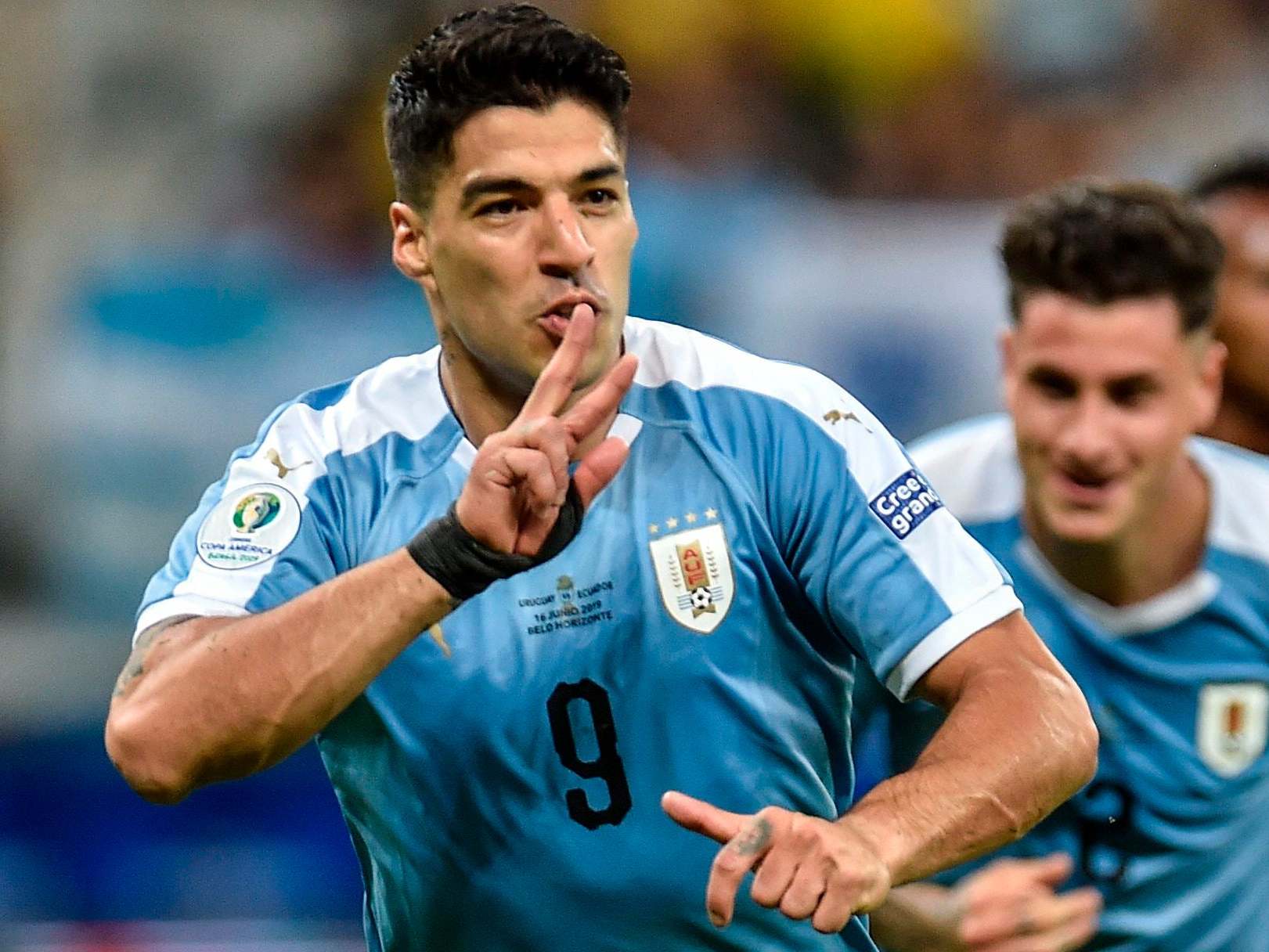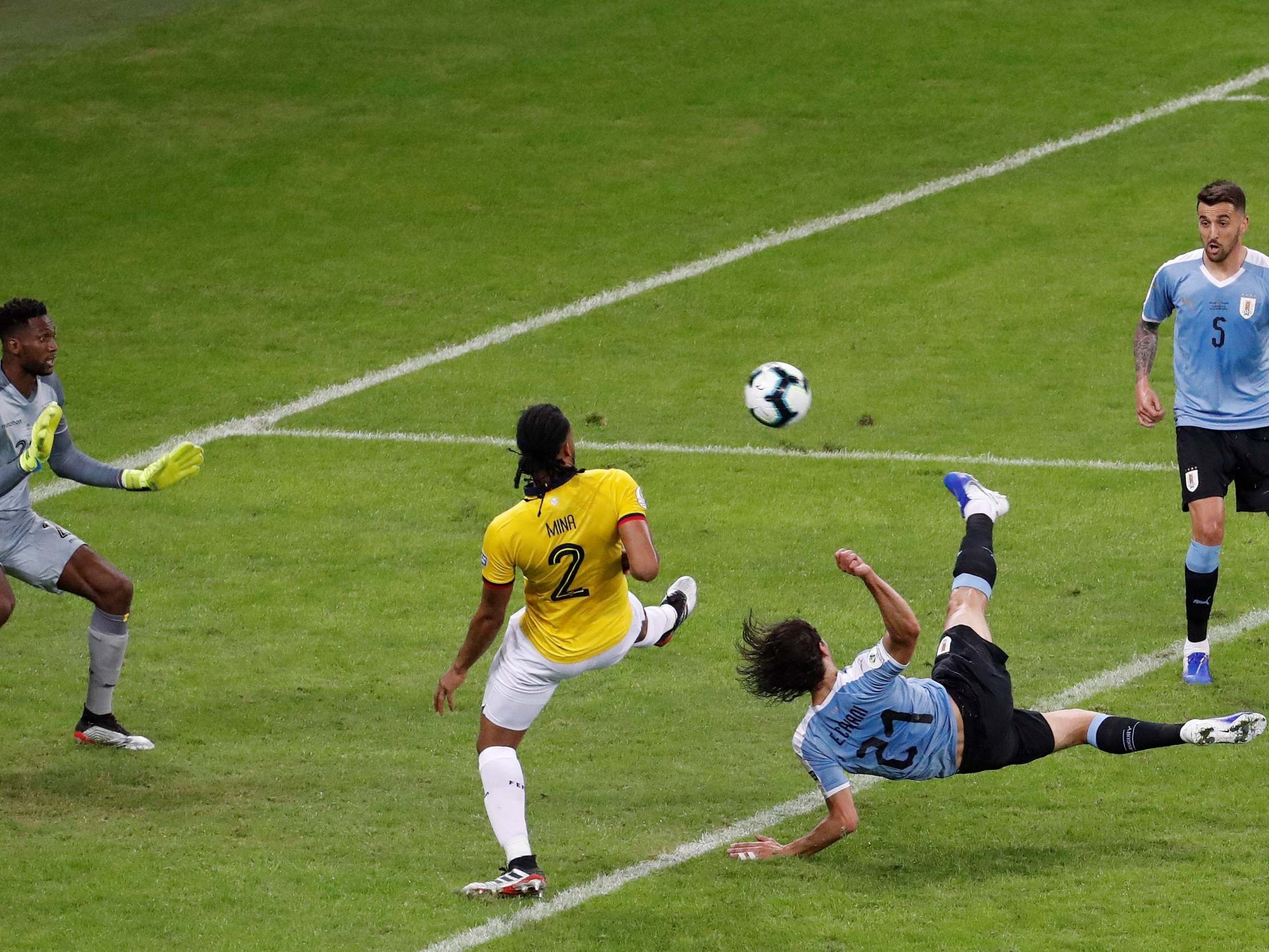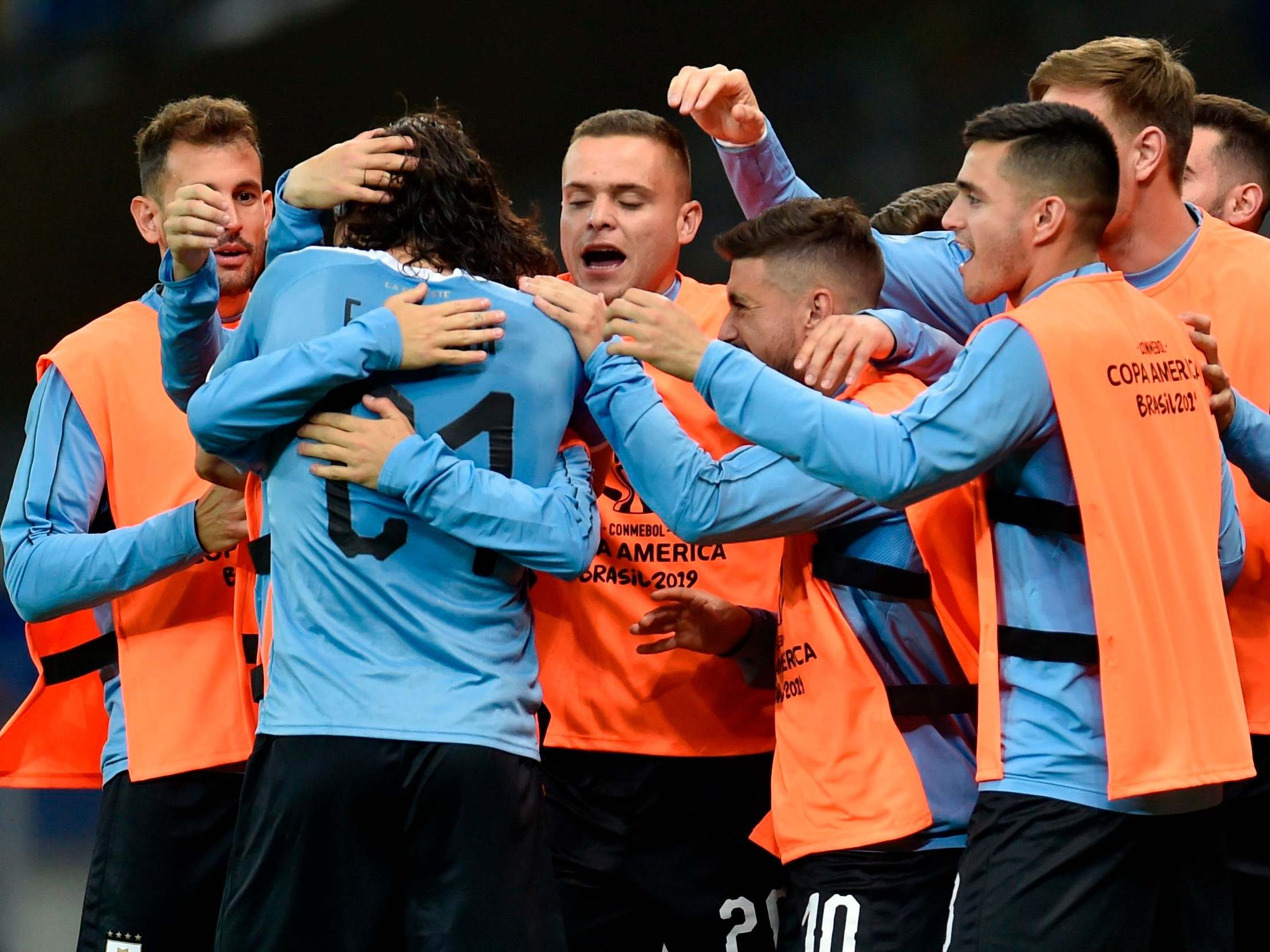Copa America 2019: Uruguay showcase unique mentality to thrash Ecuador and reaffirm status as football's greatest small nation
Uruguay 4-0 Ecuador: Luis Suarez and Edinson Cavani inspired La Celeste to a comfortable win at the Mineirão

Your support helps us to tell the story
From reproductive rights to climate change to Big Tech, The Independent is on the ground when the story is developing. Whether it's investigating the financials of Elon Musk's pro-Trump PAC or producing our latest documentary, 'The A Word', which shines a light on the American women fighting for reproductive rights, we know how important it is to parse out the facts from the messaging.
At such a critical moment in US history, we need reporters on the ground. Your donation allows us to keep sending journalists to speak to both sides of the story.
The Independent is trusted by Americans across the entire political spectrum. And unlike many other quality news outlets, we choose not to lock Americans out of our reporting and analysis with paywalls. We believe quality journalism should be available to everyone, paid for by those who can afford it.
Your support makes all the difference.Gus Poyet tells a story about his nascent years playing football. He hadn't yet reached double digits when his local team went to Argentina for an underage game and heading out the door his father had some words of encouragement.
"Don't come home if you don't win."
It reminds of a victory-at-all-costs attitude that has stunted the cerebral and creative development of so many players over the years in the British Isles. However, if back home putting results before performances had long left us behind the evolution of the game in continental Europe, then in Uruguay it's been a key, if baffling, component of their success.
It's one in a long line of conundrums and contradictions around the biggest little country in the international game. From their 72-year-old coach Óscar Tabárez preaching about building people and not players and instilling respect, versus the filth and cheating that has so often pockmarked his tenure. To their poor infrastructure and lack of money creating a conveyor belt of talent that puts footballers alongside soy and meat as their main exports.
They ought to be an afterthought but having kicked off their Copa America with a 4-0 win over Ecuador last night, the most successful side the tournament has known are again among the favourites and perhaps the most likely to topple Brazil, certainly on the basis of these first impressions. Other than Diego Godin's undercooked back-pass in the opening minutes that should have seen Enner Valencia score, they simply battered their opponents.
With all eyes on Edinson Cavani and Luis Suarez, a couple of brilliant touches and a fine finish from Nicolas Lodeiro had them ahead within six minutes. With Ecuador on the ropes, the knockout blow was a red card for Jose Quinteros for a hit to the head - about the only notable aspect of his side's dire performance.
After that, Cavani hit a post, had Alexander Dominguez pull off a fine stop, and eventually found the net via an overhead kick. He was the best on show but Suarez joined him on the scoreboard from a knockdown and it wasn't even half-time.
That scoreline was good. The width and movement was even better.
Indeed there was enough in that period to draw glances from all others, long before a subdued second period that saw Arturo Mina bundle into his own net. More startling though is if they do go all the way, they'll have double the amount of titles of the hosts. It shouldn't be that way as size should matter and it's an element that's long confounded.
Their 3.4m population is only a small city's worth more than Wales and had Tabárez himself grimly conclude an end of the glory days three decades ago.
***

Back at the 1990 World Cup, the nation's delusion was put in its place and reality bit down hard. In the lead-up a survey was run comparing fan expectation of their own team versus what rival fans considered to be their chances. It knew people overestimate their own but while Spain came out six times more positive about their team ability versus the global view, Uruguay topped the list.
They'd overestimated their quality by 49 times and lost in round two after never impressing. Tabárez went home and in a book titled 'Never Again the Champions of the World', he penned a chapter looking at the GDP and geopolitical advantages of Europe and the effect globalism was having on their patch. And still... It's been he that has made them contenders.
If the early stages of this Copa America draw little interest even locally - the Mineirao was largely deserted last night - then at least there are the back- and side-stories to enthrall.
And few, if any, are as fascinating as theirs.

Back in 2000, after Belgium had failed so miserably at their own European Championships, Michel Sablon was tasked with changing how they go about the game. What he did remains the best example to the rest of the world regarding how doing things right in this sphere can elevate the very ordinary to genuine elites. First off he had 1,500 games of youth football in the country recorded with 70 experts in fields as diverse as sports science, academia and psychology going through them over two-and-a-half years to work out what was best in areas from player touches to style to formation to both physical and mental development.
One university was given a portfolio around competition formats; a second around player skill found, as an example, that under-sevens on a full pitch didn't touch the ball much; a third looked at the physical development from players from five right up to 17. Games became five-v-five until eight years old, then eight-v-eight until 12, and only from under-13 did they play on full pitch. Within each age group there were definitions of the skills they should master by the end of each cycle. No coaching was allowed to four- and five-year-olds as they learned how to problem-solve themselves, and the first skill taught was dribbling not passing as giving the ball away is avoiding responsibility. Tactics were only introduced to teens via 4-3-3 with a flat defence as research showed it adds to skills by posing questions.
It was an astonishing piece of work yet those smaller places with fewer resources looked at Uruguay's results and went in search of how they go about their business. They were left disappointed as, unlike Belgium, so much isn't understandable.
Let alone replicable.
Turns out they have been freaks not just in what they've done, but in how they've done it.
* * *
It sounds trite but it's also true that for those in South America's smallest nation, football matters more. Take away rugby and New Zealand is still known. Take away cricket and Australia doesn't become inconsequential. But as far back as 1966, Uruguay manager Odino Viera said that other countries have their history, while they have their football. And it's been both the pride in that and fear around losing that which has honed so much there.
In the beginning there was the fabled glory. The modern game was in its infancy and hardly global, but they were quick to add four stars to their shirts with Fifa recognising the 1924 and 1928 Olympic winners as world champions. Their culture had helped shape the team, with a homogeneity in a welfare state seeing the game belonging to all colours and classes.
But soon the team would help shape the culture in a cruel reversal.
In 1950, they along with so many others believed the myth about the Maracanazo that claimed it was physicality rather than skill that had seen them win a game where Brazil fouled twice as much. Thus they stuck to what they wrongly thought had taken them to the top, their brutality only added to via frustration and struggles as a birthright was removed. Just last Friday on BBC Five Live's World Football Phone-In, Tim Vickery was answering a question about music and football being linked and fascinatingly brought up the idea of Colombia of the early 1990s and salsa, and the over-the-top drama in Italy being similar to opera. But in Uruguay it's tango which almost tragically looks back. In a country that has a national holiday based on nostalgia, that sound provided a fitting soundtrack for so long.
With just a single World Cup win between 1974 and 1994, that's where Tabárez came in. In 2006 he put together his thoughts in a dossier known as the "Project for Institutionalizing the Processes of the National Teams and the Training of Their Soccer Players". There was no trick to it though, just work as he took over the entire football programme from under-15s to senior, decorated a training ground in history, and added little touches like a traditional Uruguayan grill being put in and used as a campfire so they could shoot the breeze at night and pass on his knowledge.
Most important though was he basically removed their player production away from the corrupt club system and stole back their game. That shouldn't be enough; in a way it was.
There's nothing as technical and telling as Belgium for instance but it's at this point that national pride took over and don't underestimate it. As a telling example, contrast their stars in a privileged era of brands and egos. When Neymar and Cristiano Ronaldo kick on, so often it's been so they can win and they can attract a spotlight. Uruguay's best though?

When they last captured this trophy in 2011, Suarez sacrificed his best for the side. In fact go back the game against England in 2014 and watch how a talent like Cavani accepted his ugly and limiting role as a centre-forward playing as a holding midfielder, with his primary goal achieved when Steven Gerrard could barely connect with Wayne Rooney. That reminded that what was most important was turning in victory to the world and saying we exist.
Of course it wouldn't be Uruguay if it made sense to the point that there are now those who perhaps rightly feel Tabárez is holding them back (last night some say was an exception to the rule and the opposition must be factored in). In essence he's scared to make the most of what his approach off the field created in terms of quality and so much exciting potential.
It's one more conundrum and contradiction in arguably South America's most baffling story. And after it all, for better or worse, the attitude remains as it did in Poyet's nascent years. "Don't come home if you don't win."
Early and easy days at this Copa America, but that might not be a problem.
Join our commenting forum
Join thought-provoking conversations, follow other Independent readers and see their replies
Comments